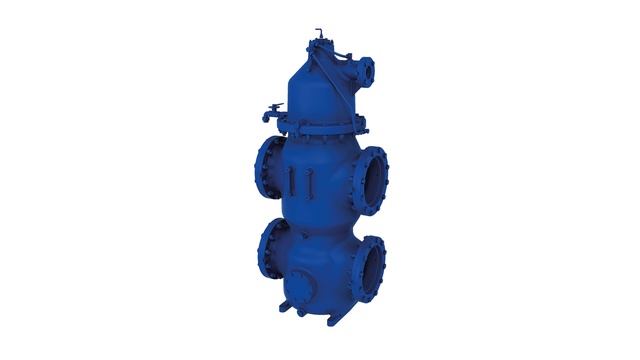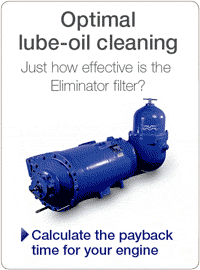Lubricating oil filters
Alfa Laval lubricating oil filters provide full-flow filtration of lubricating oils for trunk piston and crosshead engines. Types 160, 240, 280 and 350 cover all lubricating oil flows. They can also be fitted with an Eliminator combination, which provides better protection and extends the oil lifetime.
Alfa Laval automatic lube oil filter systems are designed specifically for full-flow filtering of the lubricating oils used in trunk piston and crosshead engines. Their extremely effective filtering prevents contaminants from entering sensitive parts of the engine, thus reducing engine wear and boosting reliability. Their compact, space-saving design makes them easy to install and to retrofit as upgrades to existing installations.
The continuous backflushing that is a core feature of Alfa Laval automatic lube oil filter systems prevents any solids adhering to the filter surfaces – which means no manual cleaning of filter elements is required. The filters therefore run with more than 12,000 operating hours between cleaning and inspection.
In addition, there is only a low, constant pressure drop across the filter elements, which reduces the risk of them cracking. During backflushing there is no pressure drop at all. The near-constant pressure in the engine’s lubricating oil system makes it easier to detect any malfunctions, simply by registering pressure changes.
There are three main types of Alfa Laval lube oil filter, all with an automatic backflushing system. The X type is designed for use with crosshead engines, the T type for use with trunk piston engines and the Eliminator type for use with trunk piston engines of up to 5,000 kW in capacity.
Certain X and T models are available with a special diversion chamber that collects any particles backflushed from the full-flow chamber, acting as an automatic, maintenance-free sludge treatment system. The Eliminator models actually supplement the full-flow automatic filter with another high-performance technology – a special disc-stack centrifuge for removing particles from the oil flushed out of the filter, allowing the oil to be returned to the engine sump.
How it works
The unfiltered oil entering the filter is fed by the distributor to 11 of the 12 filtering columns. Solids are collected on the filter surface and the filtered oil flows to the engine. Previously collected solids are removed in the twelfth column by backflushing
with a small amount of the filtered oil.
This is taken through a passage in the distributor via the backflushed oil outlet and back to the lubricating oil sump. The distributor, which is driven by the hydraulic motor on top of the filter housing, rotates at regular intervals to feed oil for filtration in 11 columns and to backflush in the twelfth.
In this way, all the columns are backflushed once per full rotation of the distributor, which corresponds to every one to three minutes. The pressure drop indicator connected between the inlet and outlet of the filter provides a reading and signals an alarm condition if for any reason the pressure drop reaches the alarm level. This indicates that there is a problem in the lubricating oil system.
The driving force for the automatic backflushing is the pressure difference between the clean oil outlet (P2) and the backflushed oil outlet (P3) of the filter.
A pressure drop indicator, inspection covers and counter flanges are provided as ancillary equipment. Options exist for additional features, such as magnetic plates installed on the inlet housing.


